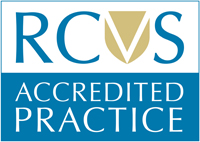Thank you once again to everyone who has donated!
Hollybank is an RCVS Accredited Small Animal Hospital… What does this mean for you and your pet?
The Royal College of Veterinary Surgeons has a voluntary accreditation scheme for veterinary practices called the Practice Standards Scheme. Hollybank chooses to be part of this scheme as we strongly believe in doing the best we can for the patients under our care. The scheme has several levels of accreditation, the highest of which is a Veterinary Hospital.
Being a hospital means that we comply with certain levels of care and provision. This is particularly relevant for you, our clients, in several areas:
We have nursing care on site 24/7 and a vet is always available to attend to our inpatients. This means that if your pet is staying in the hospital there is always someone around who is checking on them and monitoring their progress and care, allowing us to respond to any concerns as quickly as possible.
We have a range of specialist equipment on site, such as an ECG, an ultrasound machine and an endoscope. This allows us to do more involved diagnostics or procedures on site, therefore helping us to deal with more complex cases. We also have an onsite laboratory, allowing us to get vital information quickly if necessary.
We have to pass rigorous assessments. These include many areas, from monitoring patient and procedure outcomes, as well as hygiene and sterility. This gives you peace of mind about out standards of care.
We provide estimates of costs for procedures and inpatient care. We discuss options and the costs involved for your pets care, so that we can help you make the best decisions for them.
All staff are appropriately trained for their jobs and we are committed to ongoing professional development. We want to be able to provide you with the most up to date information and options by ensuring that we are constantly developing our knowledge and skills.
If you want to know more about the Practice Standards Scheme, and what it involves and influences, please see the RCVS website, www.rcvs.org.uk, visit the ‘Hospital status’ section of our website or just ask a member of staff.
Hollybank’s Brave Pet of the month…Tilly!
Tilly, a 3 year old Cairn Terrier, first came to see us when she was feeling a bit under the weather. She was being sick and was quite lethargic. Initially, as Tilly has finished her season a few weeks before, an important problem we wanted to rule out was a pyometra (infection in her uterus). On an ultrasound scan however, this was not evident. We therefore treated Tilly symptomatically for her vomiting, with a check-up booked for a few days later.
Although Tilly hadn’t continued to be sick she wasn’t feeling much better so we opted to investigate further, starting with some blood work. Although no major changes showed up on Tilly’s bloods we kept her in on some fluids, as she still wasn’t feeling 100%. Tilly soon started to feel a bit brighter and was eating, so she was discharged the following day.
Over the next few weeks Tilly was much happier, however she then had another few episodes of vomiting. As Tilly’s bloods had previously been normal we were concerned about a foreign body being stuck in Tilly’s stomach or some gastritis (inflammation of her stomach). Therefore we took some x-rays of Tilly’s abdomen to ensure we couldn’t see an obvious foreign body. The only change we could see on Tilly’s x-ray was a slightly small liver. Therefore she went home again on some medication for gastritis.
Unfortunately a few days later Tilly was feeling poorly again, not wanting to eat, and feeling very lethargic. She came back into the hospital for supportive care and a drip. As Tilly had not improved since we last checked her blood work, this was repeated. Given the nature of Tilly’s episodes and her lack of improvement we were concerned about other diseases such as pancreatitis or Addison’s disease which can be less common. With these diseases we would usually see some changes on blood work, however there are also have more specific tests that can be used. The test for Addison’s disease is called an ACTH stimulation test. As Tilly’s bloods had been normal when we last checked them we also took blood for this specific test as well.
With Addison’s disease the body’s natural steroid levels can become very low, meaning that the animal has little capacity to respond to any stressful situation. Unfortunately the clinical signs for this disease, such as vomiting, lethargy and inappetance, can be very non-specific, and fit with many different problems as we had previously considered.
Whilst we were waiting for Tilly’s blood results to come back, she stayed in the hospital so that we could continue supportive care. Whilst in the hospital she had a strange episode, where she became very weak and was unable to lift her head, even though she was aware of her surroundings. This was concerning and we were worried that Tilly was deteriorating. We therefore referred her to the University of Liverpool Small Animal Hospital as an emergency.
Liverpool confirmed that Tilly had Addison’s disease. However this only became apparent following repeat blood tests and the specific ACTH stimulation test. Tilly was a particularly challenging case to diagnose as her initial tests did not fit with Addison’s disease, even though later tests confirmed it.
To control Tilly’s Addison’s she needs to stay on two types of steroid which supplement her body’s natural steroid. She is likely to need this for life, even if we manage to reduce her medication slightly. She is particularly vulnerable to times of stress and she may need her medication managed accordingly. However she otherwise should lead a normal life and had been doing very well since she started her medication.




